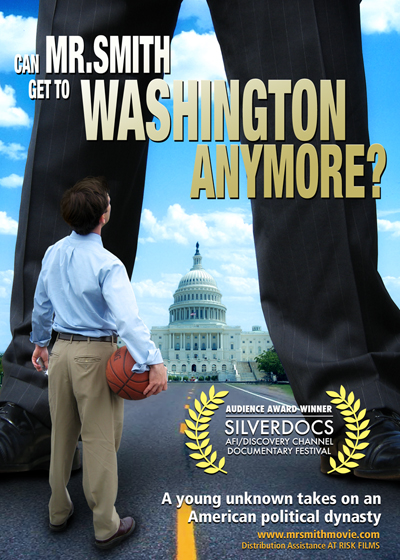Must-read piece from a truly gifted writer: Walter Kim’s counterintuitive defense of the ’12 campaign [The New Republic]
Jeff SmithRecovering PoliticianTHEN: State Senator (MO), 2006-2009, Candidate for U.S. Congress, 2004 NOW: Writer Full Biography: link
But of course, style trumps substance. And on those grounds, well, he’s no Rubio. He’s not even a Rob Portman. He’s just terminally incapable of appearing genuine. My high school basketball coach once sat in on a meeting with a college coach who was recruiting me. “Too bad you can’t teach height,” he said. The college coach nodded grimly, much as Romney’s speech coaches likely did last night. Read the rest of… Wow. What a takedown: Bill Maher’s new rule for Todd Akin [Huffington Post]
But in 1992, Missouri voters passed a law limiting legislators to eight years in each chamber. Current legislators weren’t grandfathered, and so incumbents’ days were numbered. Rodney Jetton didn’t vote on the term limits law. In 1992, he was a 24-year-old Marine stationed in the Middle East. The son of a Baptist preacher in rural Marble Hill (pop. 1,502), he hoped to seek office upon returning stateside. In 2000 — the year that the full impact of term limits kicked in — the ambitious young firebrand won a seat in the House. More than half the representatives elected that year were freshmen, and most were Republicans. After nearly 50 years in the wilderness, Republicans had a shot to regain the majority. Jetton wasn’t your typical freshman. He boarded the bus for the ritual freshman state tour with a 100-page document in his hand that he immediately presented to Minority Leader Catherine Hanaway. It was a plan to retake the majority. He forecast which districts were winnable and which weren’t. He broke down how much money it would take to win them. And he offered a roadmap for how to do it: emphasize guns and abortion to woo socially conservative Democrats like those who had long supported Sen. Staples, and use tort reform to dry up corporate contributions to Democrats (and eventually, to drain the coffers of trial attorneys). Hanaway, no dummy, recognized native political talent when she saw it. She put Jetton in charge of candidate recruitment and training.
But by 2000, times were changing. As many scholars and journalists have chronicled, the national Democratic Party had, since the mid-1960s, increasingly lost touch with the old-line Democrats, who continued supporting local Democrats but had long since stopped backing them at the national level. Jetton intuitively understood that the way to these men’s political hearts was through their gun racks. And he knew that the way to their wives’ hearts’ was through the local preacher — that’s where the life issue came in. He established a clear partisan cleavage on cultural issues that, until then, had existed only in federal and statewide elections. In just two years, he went from minority-party backbencher to speaker pro tem. In order to solidify this new cleavage, Jetton needed interest groups like the NRA, Missouri Right to Life (MRL), and the Missouri Family Network. They helped, but their support did not come cheap. The NRA, for instance, first demanded passage of concealed-carry legislation. But that proved insufficient, and the group ultimately spearheaded passage of a so-called “castle law” that even allows drivers to shoot (and kill) anyone who reaches into their vehicle. MRL wanted to ban the procedure conservatives call partial-birth abortion. Then they wanted parental consent, and worked to make it so cumbersome for abortion clinics to operate that nearly every one in the state had to close. Missouri soon had some of the strictest abortion laws in the nation. Still not satisfied, MRL sought to criminalize scientific research on stem cells. No hot-button cultural issue escaped attention. Laws prohibiting gay marriage were now deemed insufficient, so Republicans demanded a redundant constitutional amendment (which garnered 72 percent of the vote). It wasn’t enough to crack down on undocumented immigrants in the workplace. Republicans demanded a constitutional amendment making English the state’s official language, though there was no evidence anyone had ever conducted state business in any other language (until, of course, the day I filibustered that proposed amendment in French). Read the rest of… Current TV host, and former New York Governor Eliot Spitzer interviewed our own contributing RP, Jeff Smith, about the scandal swirling around MO GOP Senate nominee Todd Akin for his outrageous comments concerning rape and pregnancy. Smith served in the Missouri legislature with Akin, and has some fascinating insights. Watch below: Dana Milbank, covering Ryan’s 1st solo performance, channels Richard Ben Cramer observing Bush 41 stumping: [Washington Post]
It’s hard to add much except to say this: You will hear the phrase “No one over 55 will be impacted” more than you heard Al Gore say “lockbox.” And of course from the other side you will hear the incessant “end of Medicare as you know it” refrain. The victor of that argument will likely win the election. Amid annual trillion dollar deficits and the nation’s debt rating downgrade, I suspect that Americans are somewhat more willing than before to hear a serious conversation about our nation’s troubled finances.
But in order to prevail in that argument, Romney must tweak the Ryan plan to reduce the benefits for the wealthy and shift money towards deficit reduction. Only then would he be able to capture the moral high road.
However, doing so would alienate the very conservative pundit class that the Ryan pick has appeased, which is why I find it quite unlikely.
Today, we proudly present a new feature at The Recovering Politician. Jeff Smith, one of our most popular contributing RPs will be answering YOUR political advice questions here and at City & State, a very popular Web site that focuses on New York politics. Please send in your questions for Jeff to staff@TheRecoveringPolitican.com, and Jeff might answer them in subsequent columns.
After a 2004 congressional bid in which, as a 29-year-old nobody, I lost narrowly to the scion of Missouri’s leading political dynasty, I figured I was done with politics. But thanks largely to a documentary film about our first campaign I got sucked back in, winning a State Senate seat two years later. I adored the Senate—loved crafting policy, loved helping people, loved the camaraderie with my colleagues. Then, through an uncanny series of events involving a lie, a car bombing (in which I had no part) and my best friend’s wiretap, I spent 2010 in federal prison. Along the way I learned about politics, policymaking and people; about friendship, temptation and betrayal. Mine is a hard-won perspective, but one I’m honored to have the opportunity to share with City & State’s readers. One of the hardest things in politics is knowing whom to trust. That makes discretion critical, since asking a friend for advice can be akin to calling a press conference and broadcasting it. This column aspires to be the confidant you can trust for an unvarnished opinion: a “Dear Abby” for politicos, if you will. I look forward to answering questions about all things political, and helping readers gain their wisdom more easily (and anonymously) than I did. I’m running for office, and though I have some volunteers, most come in once, then disappear. I asked my campaign manager why and he said they were all flaky. Do you have any advice? S.E., Webster Groves, Mo. Dear S.E.: First, fire your manager; he sounds flaky. Second, sit down with volunteers when they come in. Ask them why they’re volunteering and what their dream campaign job is. Then—unless their answer involves holding a press conference or sleeping with the candidate—give them a chance to do it. They may have to hit 100 doors before they get to draft a press release, design a mail piece or storyboard a TV ad, but they’ll have a reason other than cold pizza to stay engaged. Finally, the heart of the problem: Your campaign is no fun. Make your campaign a social event. You’re the candidate; you set the tone. If you’re having fun, they will too—and you’ll attract more fun people. I used to bet my interns/volunteers on anything: One-on-one basketball, who could recruit more supporters while canvassing, which one of them could get somebody’s digits at an event. It’s possible to have a blast and be deadly serious about getting votes at the same time. I’m a legislator who screwed up. I promised a school superintendent in my district that I’d vote against new charter schools, then told the charter-school advocates that I’d support their bill, which would allow for charter-school expansion. If I seek higher office, the public-school types and teachers’ union could get me primary votes, but the charter-school lobby donates pretty heavy. What should I do? W.C., St. Louis Dear W.C.: In the future, only make promises you can keep. But since it’s too late this time, here’s what you should do. Since you appear to be agnostic about which is the best policy, call some informed constituents without a stake in the matter to feel them out. If there’s any consensus, vote that way. Then, if you must break your word, you have the one semi-acceptable excuse: “I’m sorry. I heard from my constituents and thought hard, and I decided to vote ‘No.’ This was a good lesson; next time I won’t give my word until I understand the issue better.” And tell them well before the vote so they don’t count you as a “Yes.” Last, before running for higher office, get your views straight so you’re never again making policy calls based purely on personal political considerations. It screams “hack,” and it’s why people distrust pols. I’m an elected official who recently found out that my female chief of staff had sex with three male interns. I’m not sure whether to talk to her or high-five them—she’s pretty hot. But seriously, should I say anything to her? D.A., Miami Dear D.A.: If your male chief of staff had banged your last three female interns, would you say anything to him? (Hint: Any answer that includes the phrase “high-five” is incorrect.) Read the rest of… Possibly the stupidest/most illogical political column of the cycle to date: Joe Manchin supports Obama: [Charleston Daily Mail] |
| ||
| Copyright © 2026 The Recovering Politician - All Rights Reserved | |||






















Follow Jeff Smith: